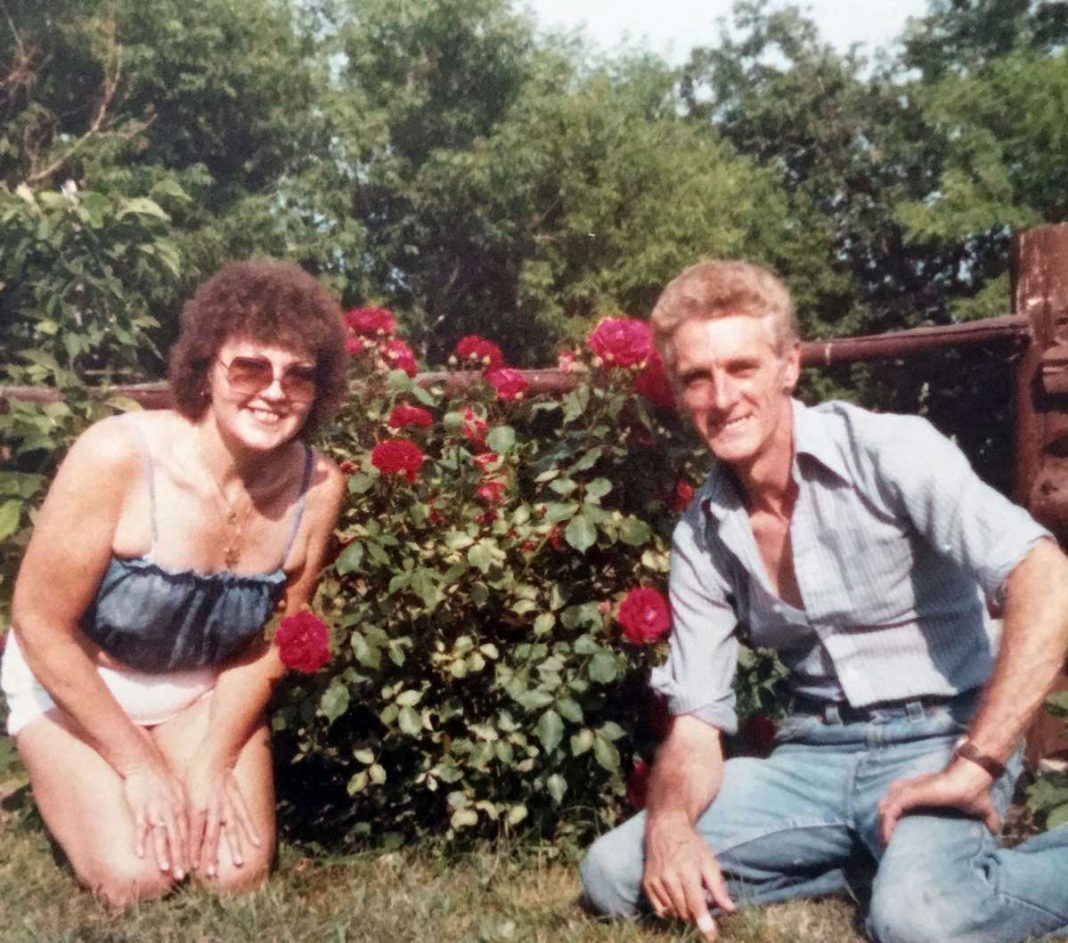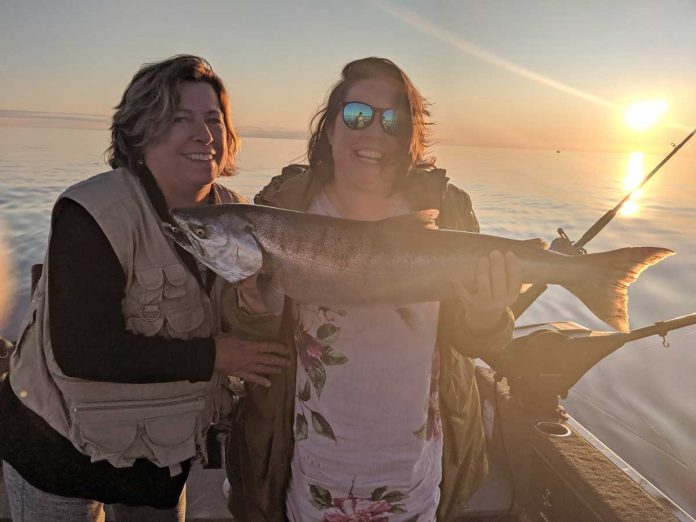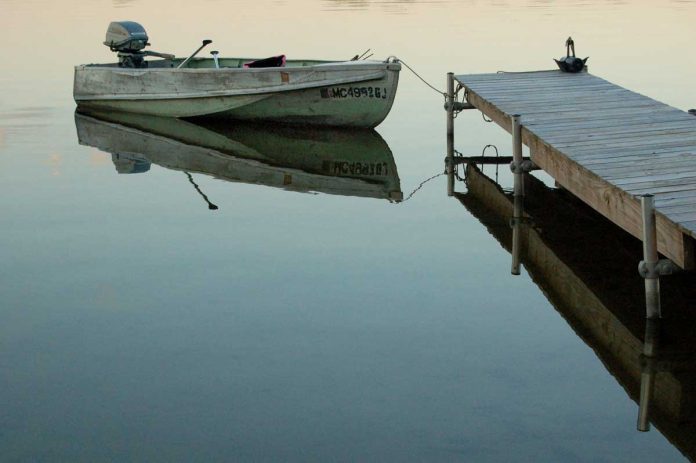This British-born resident of Manitowaning has held numerous jobs and challenged many sports and hobbies in his life-long quest for adventure, including leaving his home as a young man and moving to Canada. In Britain, Brian Sprack joined the Merchant Navy for several years, before he immigrated to Canada and joined the Canadian Army as a paratrooper and wireless operator. He spent much of his service time in the Canadian North. He met Joyce (Hembruff), the love of his life, and they eventually settled down in her hometown of Manitowaning. He continues to seek out adventure. “One day, I still want to go gliding high above the earth and enjoy the feeling of such freedom.”
His maternal great grandparents came from large working class families and were raised in the late Victorian era. When his grandmother Elizabeth was a child of three, her parents had to place her in an orphanage until they could afford to bring her home at the age of six. “My grandparents Arthur Everest and Elizabeth (Glaum) raised four children. My grandfather served and was wounded in the First World War. My mother Doris, their third child, married Percy Sprack in 1933. I was their only child, born in a small suburb of London on February 22, 1934.”

When Brian was five years old, his father entered the British Army at the beginning of the Second World War. Brian and his mother moved to the town of Dorking to stay with his maternal grandparents, who had a rented home. They lived above a small tea shop that they operated. His mother’s only brother also enlisted for the war effort and he served in North Africa. “I remember that my grandfather wrote his son one letter a week, over 200 in all. We still have those letters. I learned a lot about the past Victorian era in England and was reminded about some incidents in my own childhood in these anecdotal scribes. ‘Brian jumped off the bridge today and his front teeth went through his lip.’ This was really the follow-through of a dare. These letters are a real treasure.”
“My father was also stationed in North Africa, then Italy. He returned to Scotland, where after a brief rest he was to be redeployed to Germany. My mum and I spent some time with him while he was stationed in Dykehead, a small town near Sterling, Scotland. One evening the three of us went out to see the then-new movie ‘Gone With the Wind.’ My dad passed out during the film’s intermission. He was diagnosed with malaria. We rented a small cottage, my mum got a part-time job cleaning and we spent all the time we could with my dad until he recovered. These are the earliest memories I have of my dad. I attended school while we lived there, one English kid and 16 Scots, but it all worked out.”

Shortly after his dad returned home at the end of the Second World War, Brian happened to notice that his parents’ wedding date was engraved on the mantle clock. “I was surprised to note that I was born six months after they were married. This was only discussed once. It really didn’t matter because I knew they were great parents.”
“In wartime, the food was rationed, coal was scarce, we carried gas masks and bombing runs were normal. I saw flights of many dozens of planes in formation, heading to the continent, about seven in the evening. They returned between midnight and three in the morning with some severely damaged stragglers following behind. One of my grandparents’ friends from London came home to find an undetonated bomb on her doorstep. She left and stayed with us until it was safe for her to return.
“School was different now, with most of the regular teachers serving on the war front, and many retired teachers had been recalled. Their very ‘Victorian ideology’ did not sit well with me. I wanted to be outside, preferably fishing. One day, I threw my shoe and accidentally broke a window. I feared getting the cane and I got it—six good smacks across the behind. On the plus side, I learned a lot about the value of self-discipline and following through with your plans. The war finally ended in 1945. Rationing continued but life slowly returned to normal.”
“We stayed on in Dorking and my Dad began delivering milk for the local dairy where my mom also worked.” At age 11, Brian and a good friend sat for a naval exam. “We both passed but my friend was colour blind, and he was not admitted, so I declined too. I didn’t want to go in alone.” Brian delivered newspapers for a year, then applied to the British Merchant Navy School at Gravesend. “That was a three-month ordeal! At one point, I called my mum and asked her to come and get me. My dad stepped in and said, ‘Son, you started this, now finish it.’ I was angry and upset, however I am glad that he convinced me to stay.”
Brian spent the next four years sailing with the Merchant Navy fleet on passenger and cargo ships. He saw various ports of call, including stops in Australia, New Zealand, Africa and the United States. “Everything went by boat then because shipping by plane was too costly.” Late in 1953, Brian had saved enough to start a new life abroad. He applied to Canada House (the Consulate) near Trafalgar Square in London. “‘What do you do?’ they asked me. ‘I’m a sailor.’ ‘Good, they need sailors for the Great Lakes in Canada,’ they said.”

“My mother was always supportive. She let me do most of the things I asked to do, so long as she felt I was capable and prepared for it. Her older sister had already immigrated to Canada, so I would be able to stay with her family to start. My mom sent her a letter and I went looking for passage with the local shipping company. They told me it would be two weeks, then they put me on waiting list for the next ship going to Canada. When I got home that night, I got a call to be at the Liverpool dock at 7:30 the next morning. I had to leave in an hour to get there on time, so no long goodbyes. Mum got up from the dinner table and packed my bag. An hour later I was on the road, headed for another country on another continent, leaving my family far behind.”
“I spent my first Sunday in Toronto on the streetcars. My aunt, who lived in the city’s west side, had explained to me how the streetcar system worked. I got on at the Dundas line and just headed all the way east. Then I transferred to the north-south route without having to pay more. I saw much of Toronto that day for just 10 cents. I finally got off at Yonge Street where my footsteps echoed on the pavement. Businesses were closed and people were in church.”
“I soon found out that I was too young to be a dance instructor. Steam-fitting was not my forte, either. I had an appointment for a job, with a jewellery store owner downtown but he called to say that he would be delayed two hours for the interview.” Brian decided to walk down Yonge Street, towards Lake Ontario. “The light was red when I got to Wellesley and Yonge, so I turned right. I stopped at a recruiting station to look at the posters in the window. A deep voice behind me said: ‘You look like a likely candidate for the Canadian Army.’ A rather tall authoritative-looking sergeant bid me inside and my fate was sealed.”
“Three days later I was on my way to Kingston. I never got to the jewellery store interview.” The Cold War of the 1950s had North Americans worried about a Russian invasion from the Arctic. Brian trained as a paratrooper and a wireless operator. He was assigned to training sessions at Fort Churchill on Hudson Bay with the Royal Canadian Princess Patricia Light Infantry. Six seven-member teams parachuted from planes to land in a vast circle on the frozen tundra in November. They carried equipment and heavy batteries, slowly making their way to the central meeting point.
They slept in tents. “It was too cold to fight, in my opinion, but we did as we were instructed and got home for Christmas.” Then in January it was back to Yellowknife, Churchill and Whitehorse for winter exercises. Wireless operators kept the war exercises umpires informed about how the two military teams were doing. “It was a good three years of my life,” he reflects. “The focus was on the team, not on the individual. It is the other guy you look out for. You never want to let a buddy down.”
Brian met Joyce Hembruff in December of 1954 in Georgetown, Ontario. The restaurant Joyce worked in closed at nine in the evening so she would walk to a nearby Chinese restaurant that stayed open until eleven to catch a ride home with a friend. One night, Brian came in and struck up a conversation with Joyce. Their friendship bloomed and they saw each other during weekend passes each month until they were married on April 7, 1956. Brian got leave on Friday afternoon, hitchhiked to Georgetown and next morning got dressed for the wedding.
“We had a small reception, then it was off to Niagara Falls. It was snowing hard, so we stopped at a motel and had to be out of our room by 10 the next morning. We woke at 11, packed quickly and headed out. The roads were strangely empty, as was the restaurant we picked for lunch. The owner wondered why we wanted a western sandwich at seven in the morning.” They both laughed as they realized that Brian’s watch had stopped. The newlyweds had one great day at the Falls and then it was back to Kingston for the groom. Joyce continued to work at the restaurant in Georgetown.
“Three years in the Army taught me a lot about Canada. Things we take for granted, like how we talk to each other, what we eat and how we dress; a whole new set of customs and habits have to be learned.” After retiring from the Army in September of 1956, the couple spent six months abroad in England visiting Brian’s family in Dorking. Brian took a job as a bus conductor and Joyce did housekeeping. It was an opportunity to meet that side of the family and the couple was glad they had made this decision. After returning to Canada, Brian found that there were plenty of jobs available. Eventually he became a grocery store clerk. By the fall of 1958 they had two children, a rented apartment and were buying a car on 45 dollars a week.
They visited Manitoulin to meet more of Joyce’s family and have a fishing holiday. They stayed at Black Rock Lodge. The owner was in a predicament with no staff, so they helped him out for a few days. This led to a job offer for the summer of 1962. That spring, the family rented a small house in Joyce’s hometown of Manitowaning. The resort needed a lot of work as the water tank and piping had been destroyed by ice. Docks had to be mended, cabins scoured and so much more.
“One memorable guest at Black Rock in the spring of 1962 was a mink farmer who had an artificial leg and drove a Rolls-Royce. He took a cabin for a week and spent every minute he wasn’t eating or sleeping, on the water, fishing. He always caught his limit of bass until the eighth day when he was one fish short. He left the next day.” Brian tried to mimic his fishing techniques by using the same bait, drifting the boat in a similar fashion, but to no avail.
Another rather heavy-set guest had been starved as a prisoner of war and he was determined never to be hungry again. He ate 10 fish fillets at each dinner. “One of our younger guests, a newlywed, caught a huge 16-pound pike which he barbecued for the whole resort. Unfortunately, it was still raw by our estimation and we had a hard time eating it. I managed to hide and dispose of my portion. We ran the lodge for two summers until it was sold in the fall of 1963. We would have liked to buy it ourselves, but we just didn’t know much about loans and business back then.”
Brian and Joyce ran a series of small businesses over the next 50 years. There was a bakery, a barbershop/poolroom, a dairy bar, three restaurants, a dress shop and a Stedman’s store. The barbershop and poolroom were an 11-year stint. Brian recalls one day as he was cutting a customer’s hair, he heard whining under the shop floorboards. To the dismay of the customer, Brian began ripping up the floor—and there was the family dog, Trixie who had gone missing over the weekend. Everyone in town had been searching or on the lookout for her. The family were so happy to have their beloved pet back. “She had climbed into a crawl space under the building to get out of the pouring rain and had become stuck in the mud that built up around her as water found its way in. She should have been renamed, ‘Lucky.’”
The couple raised a foster daughter and six children. Debbie operates the Assiginack Public Library; Michael works locally for Eastlink Communications; Anne, a nurse, works in mental health and addictions in Sudbury; Shari is an educator for Manitoulin Transport out of Sudbury; Marc is a superintendent with the Toronto District School Board; Scott has his own company in the industrial field and Stacey works for Walmart in the United States. “We have 12 grandchildren and 12 great grandchildren. It’s pretty loud when we all get together.”
Sadly, Joyce’s health has declined over the last six years with Alzheimer’s. “I didn’t understand this disease. We had a long-standing rule that the last one up in the morning, usually me, made the bed. One day Joyce made the bed when it was my turn. She insisted that it was her job. Whenever I was out of her sight for long, she became upset. I convinced her one day to come with me for a ride. She liked it so much that she wanted to go several times a day after that. The Wiky Nursing Home has become her home and she is safe and very well cared-for there. We have had a wonderful marriage and that continues. When I visit her at the nursing home, I still see that twinkle in her eyes.”
“I went to Newfoundland with my three sons two years ago, and we had a ball! This March my daughter Anne and I went to Mexico. Our flight home was one of the last planes out due to the COVID-19 virus. As we were preparing to leave, the resort personnel began closing because borders were shutting down all over. It was sad to see that beautiful beach bare and empty. I isolated with my daughter at her home in Sudbury for 17 days before returning home to Manitoulin. It has been a difficult time for everyone. We are a big family and we love getting together which is not allowed right now. Recently, however, our family got together using Zoom technology. We were celebrating my son’s birthday. It was fun and we were all safe.”
“I have often wondered how our life would have been shaped if we had stayed in England in 1956, but I am happy that we decided to return to Canada where there were more opportunities for our children. My parents moved to Canada in the fall of 1958, leaving all their worldly goods behind in England so that they would be closer to their grandchildren. They never regretted their decision.”
“My strengths? I’m chatty, and I like to meet new people. I have done many different jobs and enjoyed them. I dabble at painting and carve ornaments from beach-gathered driftwood. I traded my 26-foot sailboat for a 16-foot sailboat and cutty that I still own. I have flown many model planes and kites, crashing a few. I can still do Morse code from my wireless army days and I often find myself tapping out messages on a flat surface. I always loved deciphering codes. What do I still want to do? Ride a sky glider, with an instructor along. I would like to feel that rush of exhilaration. What am I afraid of? Not getting it all done before I leave this Earth. Mrs. K.B. Mastin had a very sharp mind well into her most senior years. I once asked her what it was like to get older. She responded, ‘I feel the same as I felt at twenty, but my body just didn’t keep up.’”
“Wherever we live we tend to lose sight of the beauty around us until we leave it. Our gaze becomes more objective upon returning. This Island’s splendour is then displayed in a new light and we realize how uniquely beautiful it is here. I love to see the snow blowing in the winter, the trees coming back to life in the spring, producing their full crown in summer. I have been to many places and other countries and I have enjoyed my time there. However, Manitoulin is home and that’s always the best place to be.”





